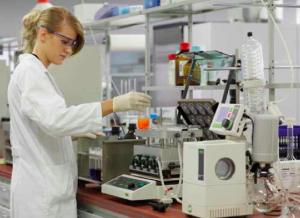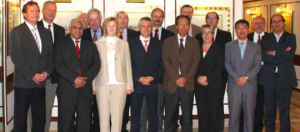 The OEKO-TEX Association has as usual updated the applicable test criteria and limit values for testing textiles for harmful substances according to OEKO-TEX Standard 100. The new requirements will come into force on April 1.
The OEKO-TEX Association has as usual updated the applicable test criteria and limit values for testing textiles for harmful substances according to OEKO-TEX Standard 100. The new requirements will come into force on April 1.
The regular re-evaluation of the test parameters is based on current market and product developments, new toxicological findings and new legal requirements, also taking into consideration the REACh legislation, including the SVHC substances relevant to textile manufacturing which have been added in 2011.
The OEKO-TEX criteria catalogue stipulates the following amendments:
• With respect to the current version of the REACh candidate list and the current consultations, wet spun fibres and coatings will in future be tested for n-methyl-pyrrolidone and dimethylacetamide. Both chemicals are listed in the new category “Solvent Residues” and must not exceed a limit value of 0.1% weight by weight.
• In addition, relevant test samples must also be tested for four new plasticisers: di-C6-8-chain alkyl phthalates, di-C7-11-chain alkyl phthalates, di-n-hexyl phthalates (DHP) and bis(2-methoxyethyl)phthalates. These will be incorporated with the phthalates already listed in the Oeko-Tex Standard 100. The total limit value of 0.1% weight by weight shall remain unchanged.
• In analogy to the existing ban on alkylphenolethoxylates (APEO) within the framework of certification of environmentally-friendly production sites according to OEKO-TEX Standard 1000, the successful testing for nonylphenols, nonylphenol-(1-9)-ethoxylates, octylphenols and octylphenol-(1-2)-ethoxylates will in future also form a prerequisite for product certification according to OEKO-TEX Standard 100.
The limit values that apply to all four product classes are nonylphenols: 100 ppm, octylphenols: 100 ppm, total nonylphenol-(1-9)-ethoxylates: 1000 ppm, and total octylphenol-(1-2)-ethoxylates: 1000 ppm.
The tests begin with the publication of the new Standard. In order to allow companies an adequate time-frame to implement any necessary changes in their production, the requirements will only come into force definitively after a transition period on April 1, 2013. This regulation does not apply to companies certified according to OEKO-TEX Standard 1000, as they already comply with the required criteria.
• The limit value for extractable chromium is set at 10 mg/kg for leather products in product class IV. This exception to the usual chromium limit values for textile articles corresponds to the best available technology on the market at the current time and does not pose any toxicological risk when such products are used as intended.
In addition to the new test parameters, the scope of the control tests on the OEKO-TEX certified products carried out throughout the world is being extended to cover 20 per cent of all certificates issued annually in future, as opposed to the minimum 15 per cent tested to date. In practice, over recent years, an average of 18 per cent of certificates have been tested using product samples taken from the shops at the expense of the OEKO-TEX Association.
A new complement to the OEKO-TEX Standard 100 is now also available, on the basis of which it will be possible to certify special products such as tents, prams, office chairs or rucksacks according to OEKO-TEX Standard 100 in future.
Delhi meet discusses major issues
 With 11,283 certificates issued in the last year alone, and more than 9,500 companies involved in the scheme in over 90 countries, the OEKO-TEX Standard 100 has once again confirmed its position as the world’s leading certification scheme for textiles tested for harmful substances.
With 11,283 certificates issued in the last year alone, and more than 9,500 companies involved in the scheme in over 90 countries, the OEKO-TEX Standard 100 has once again confirmed its position as the world’s leading certification scheme for textiles tested for harmful substances.
This was the conclusion at the meeting of the heads of OEKO-TEX institutes, which, in view of the growing number of certificates issued to production companies in Asian countries such as India, took place in Delhi for the first time on November 7 and 8 last. As always, the agenda included decision-making on the new version of the OEKO-TEX list of criteria, and internal agreement by the 15 OEKO-TEX member-institutes on the existing quality control procedures to ensure a consistent standard of testing and compliance with the required product quality, as well as on the question of international trademark protection for the “Confidence in Textiles” label.
Another focus for discussion at the meeting was an analysis of the company audits that were introduced in 2010. Since April last year, said the OEKO-TEX General Secretary, Dr. Jean-Pierre Haug, the OEKO-TEX Association had already visited over 2,000 companies internationally as part of the certification process, in order to give them customised support with implementing the OEKO-TEX requirements regarding operational quality control. “When we carry out company audits on the spot, we can clarify any unresolved issues face-to-face with the quality managers, and so help the companies to gain maximum value for money from the certification process.”
It was therefore unanimously agreed by the General Managers of the OEKO-TEX institutes that global company monitoring would continue. The aim is for all certificate-holders to have been successfully audited by 2013.
The OEKO-TEX representatives also unanimously confirmed the initiative by the technical OEKO-TEX Executive Committee to introduce checking for alkylphenolethoxylates (APEOs) such as nonylphenol as a requirement for product certification under the OEKO-TEX Standard 100 in future. From January, nonylphenol, nonylphenol-(1-9) ethoxylates, octylphenol and octylphenol-(1-2) ethoxylates will be included in the OEKO-TEX list of criteria. So from April 2013 companies will be obliged to comply with the defined limit values in all certification processes.
By also regulating these substances under the product-related OEKO-TEX Standard 100, the OEKO-TEX Association expects to have a significant impact on the global textile chain so that the use of these kinds of tensides will be considerably reduced. In order to start helping to eliminate alkylphenolethoxylates even sooner, the OEKO-TEX Association will begin testing for alkylphenolethoxylates straightaway as part of its regular control tests, and during company audits it will be helping certificate-holders to identify at this early stage the possible sources of this group of substances in their delivery chain, and to find substitutes.
Alkylphenolethoxylates have been excluded since 1995 under the production-based certification of environmentally-friendly production sites in accordance with the OEKO-TEX Standard 1000, and are tested for accordingly by the OEKO-TEX member-institutes.
The OEKO-TEX General Managers attending the meeting in Delhi were also unanimous in agreeing to extend the scale of regular control testing of certified products worldwide from the current level of at least 15 per cent of all certificates issued annually to 20 per cent in future. In practice, in recent years an average of 18 per cent of the certificates have already been tested at the OEKO-TEX Association’s own expense, using product samples taken from retailers.
Another innovation that was introduced at the meeting was a supplement listing additional specifications which would enable special articles such as tents, buggies or push-chairs, office chairs and rucksacks to be certified under the OEKO-TEX Standard 100, with immediate effect.
Finally, the heads of the OEKO-TEX institutes announced that the forthcoming 20th anniversary of testing for harmful substances under the OEKO-TEX Standard 100 would be appropriately marked by some special promotions. Planned projects include a re-launch of the existing 16-language website at www.oeko-tex.com, a specialist international conference, a Knowledge Olympics for specialist retailers in eight European countries and a competition for a media and corporate prize on the theme of sustainability.
India has issued 624 currently valid OEKO-TEX certificates, thus being the fifth in an international comparison of the countries issuing the most certificates, behind China, Germany, Turkey and Italy. Since the first OEKO-TEX branch office was opened in India in 2005, demand for OEKO-TEX product certifications from local companies at all stages of the processing chain has increased steadily and continues to do so.
Customer enquiries are now handled by four OEKO-TEX agencies, in Mumbai, Delhi, Tirupur and Ahmedabad, with a further office in Sri Lanka.